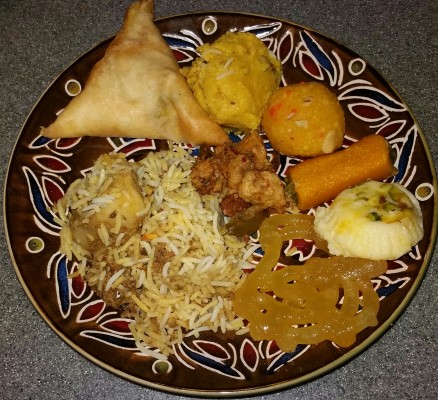Building friendships over prayer and regional foods is a delicious way to cure loneliness, enrich communities and enliven faith.
I found a perfect strawberry in my garden. It was thumbnail-sized, deep red, and so sweet it tasted like candy. It brought me back to a chat I had a few weeks ago with two ladies after a prayer gathering: one of the ladies was from Haiti; the other from India. Both loved many aspects of America, but when conversation turned to the topic of food, you could see the homesickness and longing in their faces.
The woman from Haiti talked about those sweet, tiny, wild strawberries from home, and then compared them to the fat, tasteless variety from the grocery store. She spoke of meals of rice and beans, mashed together -- such a simple combination, but the flavor secret came in the preparation, the use of garlic, onion and spices.
The lady from India had opened her home to us that night. She stirred up chai tea over her stove, and then joined us at the table. Trained as a chef, she spoke of how mangoes in India were luscious and produce in general just burst with flavor. She told of the medicinal properties of Indian herbs, spices and roots like turmeric, fenugreek, ginger and cumin, and the healing properties in vegetables like the bitter gourd.
She felt Indian food was best enjoyed the traditional way, by eating with the right hand. Food taken with the fingers released the true flavor over food taken in a fork or spoon. Both the ladies spoke of their concern of all the chemicals in our food in America and how they believed it robbed our plates of flavor.
We had this conversation over a meal of Indian samosas (little pastry packets filled with ground beef), baby corn dredged in spiced batter and fried, and chicken baked in cream cheese and cilantro. (On a later visit, she packed me home with packets of briyani mutton and lentil dal, and sugary, milky sweets including Jalebi and Laddu…so good!)
I’ve known my friend from India for more than a year but had just met the lady from Haiti that night. After a shared Rosary and over delicious food and conversation, we all easily relaxed and became friendly.
The Haitian lady shared fascinating tales of her homeland: of walking miles to fetch fresh water; the challenge of washing a bin full of dishes with a tiny bucket of water; and how her kids here in America complain over a tiny sink full of dishes and abundant water. Back in Haiti, the homes had power just a couple of hours a day.
Our hostess told of living in an apartment complex in a mostly-Catholic neighborhood in India. Each floor in her building featured a shrine to the Blessed Mother. The bell would ring before dinner each night and children would come running. Families would gather on landings for a pre-dinner Rosary.
Everyone in her neighborhood knew each other, she said. They walked freely in and out of each other’s homes, brought meals and little gifts to brighten the day. When she moved to America she cooked dinners and brought them to her neighbors to introduce herself, but received a mixed reaction. Today, she lives alone in her town home and is often lonely. She says neighbors often seem too busy to take time for each other. If she’s lucky, she’ll get a wave from someone as he or she backs a car from a driveway.
Blessed Mother Teresa said our first mission territories were those in our homes and neighborhoods. I’ve lived in a small country town, where my Rosary group became like family. When I gave birth, my husband and my families celebrated and rallied with assistance. But the Rosary ladies also adopted us and we didn’t have to cook for two weeks. I’d get a knock on my door from a friend driving by, wondering if I might like to take a break from laundry to pray a Rosary.
So that beautiful sense of community that my new Indian and Haitian friends described does also exist here in America. Also, many here raise vegetables and herbs in organic gardens in suburban yards, so experience the bursts of flavor that fresh, whole food brings.
Those experiences of sweetness in community, and the flavors to be relished in fresh, pure foods can draw us deeper into faith. It was faith that drew me to meet these ladies from such different cultures in the first place.
If you don’t belong to any sort of prayer, Rosary or community group, you might find yourself and your family feeling isolated. You attend and meet Jesus in the Mass, but perhaps you don’t know anyone in the congregation, even after all these years. If you’re in that situation, look in your parish bulletin and find a little prayer, Rosary or mission group to try. You might love it.
If you’re already attending a group, then think of the lonely people in the congregation who might not have discovered any friends in faith yet. When you go to one of those donut gatherings after Mass and see someone alone, maybe you could sit next to them, instead of always turning to your comfortable friends.
Also, when we choose to reach out to those who look different and who hail from different parts of the world, God will reward that little outreach. The Church is universal and God’s qualities are expressed in an amazing variety of ways through His peoples and cultures. As we mix with others from various cultures, it will open our eyes as to different Divine attributes, as well as provide us with great conversations, companionship and some amazing food along the way.
So say a little prayer and reach out. If at first you don’t succeed, try again, and you’ll be developing a missionary heart and outreach -- a heart open to evangelization, and more of an international heart, right in your home parish and neighborhood.
About the Author

Guest
We welcome guest contributors who graciously volunteer their writing for our readers. Please support our guest writers by visiting their sites, purchasing their work, and leaving comments to thank them for sharing their gifts here on CatholicMom.com. To inquire about serving as a guest contributor, contact editor@CatholicMom.com.




.png?width=1806&height=731&name=CatholicMom_hcfm_logo1_pos_871c_2728c%20(002).png)
Comments